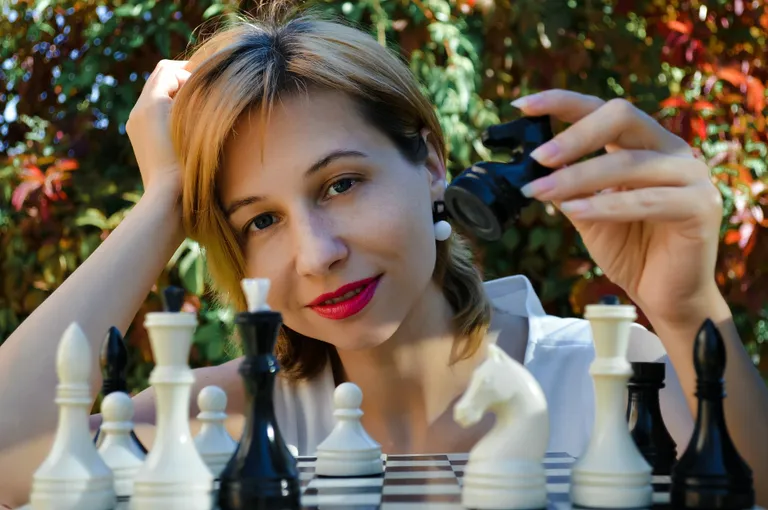Every day, Jennifer played chess with a homeless man who shared his stories with her. One day, he borrowed money and then disappeared! In despair, Jennifer sat down at the chess-playing table in the city park. Suddenly, she noticed a piece of paper under the chessboard. It was a note unmistakably addressed to Jennifer!
Jennifer walked along the park’s winding paths, her heart heavy with grief from her father’s recent passing. The quiet solitude of the park served as both a refuge and a poignant reminder of their shared moments.

For illustration purposes only | Source: pixabay
Lost in her thoughts, Jennifer’s attention was captured by an older man playing chess alone at a concrete table. His clothing was nondescript and faded. His hair was gray and unkempt, adding years to his appearance, yet his eyes still had an indomitable spark.
Sitting on an old, peeling bench that was as weathered and seasoned as he was, he seemed to be a part of the park. Every day for the past week, she had noticed him, always alone and lost in thought. Jennifer approached him.
“Mind if I join you?” she asked, gesturing to the empty seat across from him.

For illustration purposes only | Source: pixabay
The man looked up with a slow, welcoming smile. “Of course not. I’m Tom,” he replied in a gruff, friendly voice.
“I’m Jennifer,” she responded, taking her seat and arranging the black chess pieces.
As they played, Tom shared stories of his past. “I used to be an artist,” he mentioned, hinting at nostalgia in his tone. “I painted landscapes mainly, the kind you can lose yourself in.”
Jennifer moved her knight, intrigued but skeptical. “It must have been wonderful to create something like that,” she replied.

For illustration purposes only | Source: pixabay
Tom chuckled, his deep voice echoing softly in the park. “Oh, it was! Maybe one day I’ll show them to you if you’re interested.”
Their conversation turned deeper, touching on painful themes.
“Did you find it difficult to let go of your art?” she inquired, drawn into the rhythm of their exchange.
“Letting go isn’t the right term. It’s more about transformation. The art never leaves you; it just changes form. Now, instead of landscapes on canvas, I paint strategies on chessboards.”

For illustration purposes only | Source: pixabay
His words struck a chord with Jennifer, who was struggling with her own losses.
“I wish I could see it that way. Since my dad passed, it feels like I’m just… stuck, unable to move forward.”
“Loss is a tough opponent,” Tom’s voice was comforting.

For illustration purposes only | Source: pixabay
“But remember, in chess, as in life, the game goes on until the last piece falls. Your father, like a good king in the game, may have left the board, but he played his part, setting up the pieces for you to continue.”
As they continued their game, the setting sun cast long shadows across the park, and Jennifer decided to come here every day.

For illustration purposes only | Source: pixabay
One day, when they started their game, Jennifer noticed Tom seemed more distracted than usual. He hesitated longer over his moves, and his brow was furrowed in thought.
“Jennifer,” Tom began, “I find myself in a bit of a tight spot. I hate to ask, but I need to borrow some money. It’s not much, just enough to do something important for me.”
Jennifer paused, her hand hovering over a knight. She looked up, meeting Tom’s eyes.
“How much do you need?” Jennifer asked.
“50 dollars,” Tom replied, the words coming out quickly, as if he wanted to get them over with as soon as possible.
Without hesitation, she reached into her purse and pulled out a fifty-dollar bill. She handed it to him across the chessboard.
“Here, take this. And don’t worry about returning it soon. Pay me back whenever you can,” she said warmly, trying to comfort him.
Tom took the money, his hands shaking slightly as he accepted the bill. “Thank you, Jennifer. I truly appreciate this. I promise I’ll return it as soon as I’m able.”
Tom smiled across the chessboard, a genuine smile that reached his eyes. “You’re very kind, Jennifer. It’s rare to find such generosity these days.”
The game ended with Jennifer as the winner, but the score seemed unimportant now. They packed up the chess pieces together, chatting lightly about the park, the weather, and their plans for the coming days.
The following day, Jennifer arrived at the park earlier than usual and stepped quickly in anticipation of another chess game with Tom.
But as she approached the familiar chess table, she noticed the gentle, stooped figure of Tom absent. The chessboard lay untouched.
“Oh no, where could he be?” Jennifer muttered to herself, a knot of worry forming in her stomach.
“Did he just run off with it? Was he just a scammer after all?” she thought.
Jennifer sighed and sat at the table, resting her elbows on the cold concrete, her eyes caught a glimpse of something unusual. A corner of a sheet of paper peeked out from under the chessboard.
Jennifer pulled it out and unfolded it, her breath catching as she took the contents.
“Wow, this can’t be…” she gasped, staring in awe at the portrait.
Unmistakably her face staring back at her from the paper. The details were meticulous—every curve, every shadow artfully rendered with a realism that spoke of a skilled hand.
“This… he really did this?” Jennifer whispered to herself. Turning the sheet over, Jennifer’s eyes fell on an address scrawled in hasty pencil strokes.
“What’s this? A clue from Tom?” she murmured, her curiosity piqued.
She pulled out her phone to look up the address, tapping rapidly on the screen. Her search returned no results for her city. Expanding her search to neighboring areas, she found the address pointed to a location in the next state.
“An adventure, then?” She carefully folded the portrait and slipped it into her bag, a smile playing on her lips.
“Looks like I’m going on a little trip,” she mused.
She was lying on the ground, thinking aloud, “Maybe when I find him, we’ll have a lot more than just chess to talk about.”
Jennifer felt a bit nervous the next morning as she approached the rental car. She started the engine.
As she drove, the landscape shifted from the familiar cityscape to more scenic, rolling hills and patches of dense woodland. The journey was long, and Jennifer used the time to reflect on her recent encounters with Tom.
Finally, Jennifer arrived at the small town. The place had a quaint, almost storybook charm, with its cobblestone streets and cheerful flower baskets hanging from lampposts.
She parked the car near the town center and walked the last block to the local café mentioned in the note.
Stepping inside, Jennifer was immediately struck by the cozy, welcoming atmosphere. The walls were adorned with various artworks, but one painting in particular caught her eye.
It was a stunning landscape, painted in a style undeniably reminiscent of Tom’s. The brushstrokes were bold yet intricate, and yellow and green were preferred in there.
Jennifer approached the counter, where a young barista was arranging pastries in a display case.
“Excuse me,” Jennifer started, “could you tell me about that painting?” She pointed to the landscape that had captured her attention.
The barista looked up, following Jennifer’s gaze.
“Oh, that one? It’s been getting a lot of attention lately,” she replied, her eyes lighting up.
“It’s by a local artist. He was here just yesterday, a fascinating man. He left with a woman named Cynthia. Seemed in a bit of a hurry.”
Jennifer’s heart skipped a beat, “Cynthia? Do you happen to know where they went?”
The barista nodded, pulling a notepad from beneath the counter and scribbling something down, “Here’s the address.”
Jennifer thanked her and stepped outside, her mind racing. Who was Cynthia? What was her relationship with Tom? She got back into the car and drove towards what she hoped would be answers.
Jennifer’s heart raced as her car stopped in front of a beautiful, sprawling property. The house before her was impressive, with ivy crawling up its stone facade.
It was surrounded by a lush garden filled with vibrant flowers and manicured hedges, strikingly similar to the backdrop of the painting she had admired in the café.
Taking a deep breath to calm her nerves, Jennifer approached the ornate iron gate. She pressed the intercom button. After a moment, a woman’s voice crackled through the speaker.
“Hello, can I help you?” the voice asked, its tone polite but guarded.
“Hi, I’m Jennifer. I’m looking for Tom. I’m an old friend of his,” Jennifer replied, trying to sound confident.
There was a pause on the other end, and then the gate buzzed open. “Please, come in,” the voice said.
Jennifer walked up the stone pathway and reached the front door. It revealed a woman in her mid-fifties, dressed elegantly in a classic clothes. Her hair was grey.
“You must be Jennifer. I’m Cynthia, Tom’s niece and caretaker,” the woman introduced herself, extending a hand.
“I’m afraid Tom isn’t well today. He’s been having some tough days, health-wise.”
Jennifer shook her hand, noting the coolness of Cynthia’s touch.
“I understand. I just wanted to see how he was doing. We spent some time together recently, and he mentioned his artwork to me,” Jennifer explained, watching Cynthia’s face for any sign of reaction.
Cynthia’s expression remained composed.
“Yes, Tom loves to talk about his art. However, he needs to be up for visitors. I’m afraid today is not a good day.”
Jennifer nodded, but something in Cynthia’s demeanor didn’t sit right with her. There was a rehearsed quality to her words as if she had anticipated this conversation.
Jennifer already had a new plan.
Gates shut behind her neck, but Jennifer couldn’t just walk away, so she sat in her car and waited.
She saw the mailman approach the house, delivering a stack of envelopes. Seizing the opportunity, she approached him with a friendly smile and a small bribe.
“I think my uncle might be receiving some important health documents by mistake at this address. Could I check the mail for his name? It’s urgent,” she explained. The mailman agreed.
Flipping through the letters, Jennifer’s eyes widened as she came across several official-looking documents. One was a deed transfer detailing plans to move ownership of Tom’s property to Cynthia.
Another envelope contained medical reports that diagnosed Tom with Alzheimer’s disease, stating his incapacity to manage his affairs.
Jennifer also found a bill from a nearby nursing home in the mail. This information was a crucial lead.
“Thank you so much, you’ve been incredibly helpful,” Jennifer said to the mailman, handing back the rest of the mail.
With the nursing home’s address in hand, Jennifer knew her next stop.
Jennifer arrived at the nursing home with a brand-new chess set, purchased just that morning. She had chosen one with large, easily graspable pieces, thinking it might be easier for Tom to handle.
Her heart pounded as she set up the chessboard on one of the garden tables. Would Tom remember her? Could this chess set spark something in his memory?
She didn’t have to wait long to find out. A caregiver soon approached, wheeling Tom towards the table. He seemed frail, much more than she remembered from their park meetings. As he looked up and met her eyes, there was no flicker of recognition—just a polite, vacant smile.
“Hi, Tom,” Jennifer said gently, trying to mask her disappointment. “I thought we could play a chess game, like old times.”
Tom nodded agreeably but silently. They began to play, and for several minutes, the only sounds were the soft clicks of the chess pieces and the distant chatter of other residents.
Suddenly, in the middle of their game, Tom’s hand paused as he was about to move a pawn. He looked up at Jennifer and murmured, “Jennifer? Is that really you?” Jennifer’s heart leaped.
“Yes, Tom, it’s me,” she replied. Before they could speak further, a sharp voice cut through the garden’s quiet.
“What is going on here?” Cynthia was striding towards them, her expression thunderous. Behind her, a flustered staff member hurried along, evidently the one who had informed her of Jennifer’s visit.
Cynthia reached the table and slammed a small envelope next to the chessboard.
“I believe this belongs to you,” she said icily, addressing Jennifer. “Tom had borrowed money from you, correct? Here it is. Now, I must ask you to leave.”
Jennifer picked up the envelope but didn’t open it.
“Cynthia, I just came to see how Tom was doing and to play a game of chess with him. That’s all.”
“Well, your visit is disrupting his routine. He’s in a delicate state, and your presence isn’t helping,” Cynthia snapped.
“Thank you for whatever you did to help him find his way back, but from now on, he needs professional care and a stable environment. These kinds of emotional upheavals are not good for him.”
Tom, meanwhile, looked from Cynthia to Jennifer.
“I understand that he needs care,” she said firmly, “but denying him contact with friends isn’t right. He remembered me, Cynthia. Doesn’t that mean something?”
She glanced at Tom, who was now quietly watching the chess pieces as if trying to escape the tension around him.
“Okay, Cynthia,” Jennifer said quietly.
“I have to go, Tom. But we’ll meet very soon. I promise you.” Jennifer walked away, her head high but her heart heavy. She knew this wasn’t the end of her journey to help Tom.
She was ready to deliver a checkmate.
Jennifer knew she needed to take decisive action to protect Tom. She contacted a reputable lawyer specializing in elder law and explained the situation in detail.
Together, they gathered all the evidence of Cynthia’s actions, including the medical reports and property transfer documents that Jennifer had discreetly obtained.
A few days later, Jennifer, her lawyer, and two police officers approached Cynthia’s residence.
“Ms. Cynthia, we have gathered substantial evidence that you have been exploiting Tom’s illness for your personal gain,” Jennifer’s lawyer stated firmly, holding up a folder thick with documents.
“You’ve moved him across state lines and attempted to transfer his property into your name forcibly.” Cynthia’s face paled, her eyes darting nervously between the lawyer and the police officers.
“I… I can explain,” she stammered, but the lawyer’s resolve told her that the situation was severe. After a tense discussion, she agreed to make a full confession in exchange for a promise of leniency.
With Cynthia’s confession secured, Jennifer successfully petitioned for guardianship over Tom, ensuring he could return to a stable and caring environment.
She arranged for him to receive the proper medical treatment and made sure his home was a place where he could again engage in painting and chess, which brought joy and stimulation to his life.
Tom’s health gradually improved under Jennifer’s care. One sunny afternoon, as they sat together playing chess in his garden, Tom looked up at her with a gentle smile.
“Thank you, Jenny,” he said, his voice warm with affection. The way he called her ‘Jenny’ reminded her of the nickname her father used, bringing a tear to her eye.
Jennifer found immense consolation in helping Tom. The communication and care she provided not only helped Tom recover but also aided her own healing process from her father’s death.
Tell us what you think about this story, and share it with your friends. It might inspire them and brighten their day.